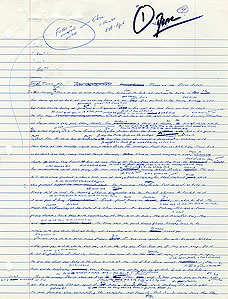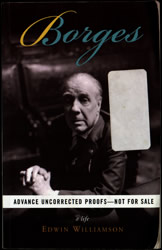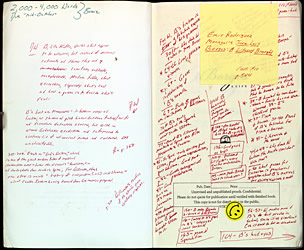Into the mind of David Foster Wallace
A few years back when I was working on craft at USF, I found inspiration in the idea that writers work in perpetual dialogue with their fellow scribes — not just immediate peers, but also those across geography and time. The books whose authors spoke to you — the ones that you kept returning to and sat with and spoke back to — granted insight and spurred productivity as much as any workshopping of manuscripts ever did. That kind of literary communion was something David Foster Wallace knew well. The archive at UT has already put some of his on display, with this look inside some of DFW’s intricately annotated books. (Click on the images at the above link to zoom in.) Inside his copy of The Puttermesser Papers, for example, you can see his studied list of Cynthia Ozick’s diction, from “telluric” to “pullulating” to “fructuous.” Notes scrawled inside the cover of Don Delillo’s Players reveal traces of his thinking about The Pale King, a novel he had yet to complete at his death: “Guy hired as lawyer for IRS. Sent to Peoria, but no one ever complains or contests audits in Peoria.”
Even just visually, as his copy of “Borges: A Life” shows, it’s easy to see that DFW’s immersions went deep:
There’s also a poignancy to seeing these snatches of handwritten script, an intimate reminder of his tragic, early exit. May the scholars soon get to work at UT and take us even deeper into the mind and methods of one of the great writers of his generation.
UPDATE: Lots more on the contents of the DFW archive from the New Yorker’s Book Bench blog.



Leave a comment